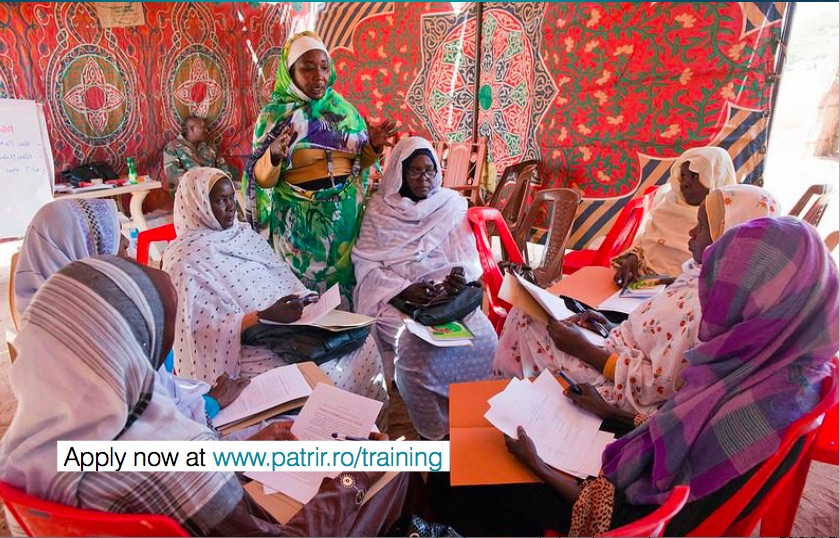… EDUCATION FOR PEACE …
Information from Claire Payne, Global Coordinator of the International Peace and Development Training Centre (IPDTC)
Our teams at the Department of Peace Operations (DPO) and the International Peace and Development Training Centre (IPDTC) have provided customised programmes for UN missions and agencies all over the world, as well as for governments, negotiating parties, intergovernmental organisations, and local, national and international organisations working in peacebuilding, violence prevention, social cohesion, and post-war stabilisation, recovery and peace consolidation.

We are launching now our Calendar of Training Programmes for the second half of 2017 and 2018 which include a series of Advanced Certificate Programmes at the IPDTC Global Academy in Cluj-Napoca, and Executive Leadership and Intensive Core skills Trainings in London. From January 2018 we will also offer online programmes on addressing radicalisation and violent extremism and core skills for Designing Peacebuilding Programming for peacebuilding, mediation and prevention.
In October of this year we are hosting the two Advanced Certificate Programmes:
1. Making prevention, early warning & peacebuilding effective: lessons learned, what works in the field and core skills
This is a hands-on and practical program created to assist governments, inter-governmental organisations and civil society organisations and agencies in the field. It is the only one of its kind internationally going in-depth into what works in prevention, how to make early warning systems effective, and how to do peacebuilding with impact to prevent wars, armed violence, and crisis escalation. Prevention, Early Warning and Peacebuilding draws on the key lessons from the field, experiences on the ground, and real case studies to identify critical lessons and challenges in peacebuilding and prevention – and how they can be addressed in practice. The programme also focuses on developing a customised roster of measures, tools and approaches to making peacebuilding and prevention work effectively on the ground in participants own contexts.
(continued in right column)
Where is peace education taking place?
(continued from left column)
Prevention, Early Warning and Peacebuilding offers participants an intensive, stimulating and challenging environment with experienced practitioners and policy makers from the UN, governments, and local, national and international agencies and organizations from around the world. This allows participants to learn together with practitioners from multiple conflict contexts, agencies, and levels of operation and engagement. Staff of the International Peace and Development Training Centre (IPDTC) and PATRIR’s Department of Peace Operations provide tailored support to assist participants in enhancing in-depth knowledge, applied skills and customized approaches relevant for their needs and contexts. The programme also assists review, development and strengthening of national and organizational strategies and early warning and prevention systems, tools and approaches.
2. Designing peacebuilding programmes: improving the quality, impact and effectiveness of peacebuilding and peace support
This is an intensive training programme designed for agencies, organisations and practitioners working in conflict, crisis and post-war stabilisation and recovery who wish to to improve the quality, effectiveness and sustainable impact of their programmes – including crisis management and prevention, peacebuilding, social, economic and political stabilisation, reconciliation in divided communities, and post-war recovery, rehabilitation and development.
Drawing on more than 30 years of experience in over 40 countries, Designing Peacebuilding Programmes represents the most advanced training programme of its kind for policymakers, practitioners, government officials and donors internationally.
There is a gap between the scale of people’s efforts and investment, the huge number of programmes, activities and organisations in the field, and the impact this is all having on peacebuilding and sustainable post-war recovery and stabilisation. This programme has been designed to close that gap. It is practical and operational, designed for policy makers, donors and practitioners, and those dealing with the daily challenges of peacebuilding, development and recovery in areas affected by war and violence. Unlike almost every programme in the field today, it draws from across the entire breadth of operational experience, lessons learned and practical methodologies – doing so in a way that has been designed to enable agencies and organisations to go in-depth into their work and how they are doing it, coming out with better designs, better approaches, and with real effects.
There is a reduction of 15% if three or more members of an agency / organisation register. You can also find out more information at www.patrir.ro/training.